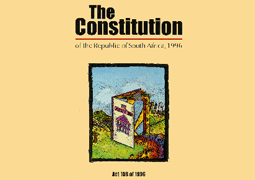
The South African Constitution attaches no special privilege to any member of either the executive, the judiciary or the legislature. They are all subjected to it in equal measure. That is why South Africa is often referred to as a constitutional democracy. The Constitution reigns supreme above anyone and everything else. It is a blueprint of the South African law-making processes, it influences how such laws should be enforced and how the executive implements legislation. But it is Parliament that is charged with the task of conducting oversight to ensure that other organs of the state are accountable to our Constitution.
As a result, the President and the Deputy President are often required to appear before Parliament to give account to matters arising from issues related to their implementation of national legislation. This is in accordance with Section 92 of our Constitution. Section 92 of the Constitution (Sub Sections 1, 2 and 3) stipulate that the Members of the Cabinet are accountable collectively and individually to Parliament for the exercise of their powers and the performance of their functions.
It further states that this is to ensure that they act in accordance with the Constitution and provide Parliament with full and regular reports concerning matters under their control. To achieve this mandate, Parliament has come up with various mechanisms such as debates and question times to hold the executive accountable to its executive authority of implementing national legislation.
When the President and Deputy President appear before the House, they do so during question times or during debates. The President often appears before the House during the State of the Nation Address debate. In this debate the President is often expected to respond to the Members of Parliament’s questions regarding matters arising from commitments he or she has made during the State of the Nation Address.
But also there is question time. According to Rule 210 of the National Assembly, the President must at least once every quarter appear before Parliament to answer questions arising from his executive authority or the implementation of legislation by the Executive Members of his Cabinet. There are only six questions of national and international importance that can be posed to the President during question time.
Whenever the President appears before the National Assembly during question time, he does so to give effect to this rule. But most importantly, this is one of the mechanisms that Parliament utilise to give effect to its oversight mandate over the President and Cabinet Members. Question time is not only limited to the President, according to Rule 210 of the National Assembly, the Deputy President, as a Leader of Government Business, is also required to appear before the House to answer, among other things, questions related to the passage of Bills or matters of political nature.
As the Leader of Government Business, the Deputy President’s question time seeks to certify that Cabinet Ministers comply with parliamentary rules and what is expected of them as members of the Executive Authority.
According to Committee Rules, if a Committee is not happy with the attendance or conduct of a designated Minister, the said Minister can be reported to the Leader of Government Business to ensure that he or she complies with the mandate of the Committee that flows from our Constitution.
Section 92 of the Constitution and question time of Rule 210 of the National Assembly are at the heart of our constitutional democracy and its culture of accountability. Of all, the question time has proven to be the most effective mechanism of accountability and through it South African citizens get to see Parliament’s oversight mandate in action. Symbolically, it has also given effect to the supremacy of our Constitution over every South African citizen irrespective of his or her status. Most of all, it has restored the powers vested by our Constitution in our Parliament as a custodian of our parliamentary democracy.
Based on these constitutional imperatives of accountability and the Rules of Parliament, President Cyril Ramaphosa and his Deputy, Mr David Mabuza, appeared before the National Assembly at separate times recently.
By Abel Mputing
23 March 2018

